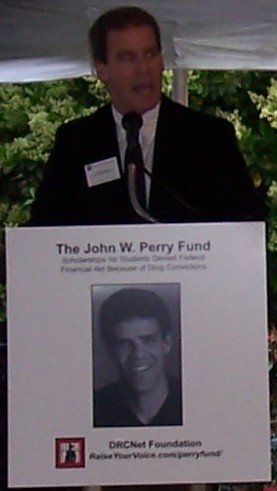Feature:
Conference
to
Plot
Drug
War
Exit
Strategy
Gets
Underway
in
Seattle
12/2/05
In a historic conference that got underway yesterday in downtown Seattle, drug reformers, scholars, activists, and experts from across the USA, as well as Europe and Canada, met to begin to plot strategies to move from drug prohibition to a regulatory drug control regime. Organized by the King County Bar Association (KCBA) the "Exit Strategy for the War on Drugs" conference is also bringing Washington state legislators, judges, and other public officials into the mix as it seeks to study the "pragmatic, nuts-and-bolts details of alternative drug control model."
"We're not here today to talk about what's wrong with the war on drugs," said Goodman, acknowledging a broad consensus among the crowd that the drug war was a failure. "We are talking about where to go from here. This is a historic meeting." To befit the occasion, Drug Policy Alliance's Ethan Nadelmann gave a Thursday morning speech challenging audience members to really think about what they are trying to achieve and the best means of doing so. "Is there a way to think about the far-reaching alternative, legalization? The optimal policy is one that reduces the harms of drugs and the harms of the drug control system," he maintained, telling the story of a 1990 Princeton round table on drug policy. "We used a form of intellectual stretching. We started with the prohibition model and asked how could we stretch it to reduce its harms while sustaining its benefits. Then we considered a libertarian supermarket model and thought -- gasp! -- millions would drug themselves and society would crumble. But what if we could impose constraints and regulate it, what if we could stretch that model?" The Princeton group couldn't quite square the circle, Nadelmann said, splitting over issues such as whether and how the state should be involved. But an interim model eventually emerged, "the mail order/vitamin house model," where a single, legally licensed drug supply house would accept orders for any drug from any adult anywhere in the United States. "The model is based on two assumptions," Nadelmann elaborated. "First, our core principle is nobody deserves to be punished simply for what they put into their bodies absent harm to others, and second, people have the right of access, to obtain the substance of their choice from some legally regulated producer and supplier." Such a model is not a libertarian free market model -- it does not assume a right to sell -- and it leaves room for flexible approaches in the states, Nadelmann said. The benefits would be obvious. "This would surely devastate organized crime, eliminate most of the criminal market, and the problem of adulterated drugs," he argued. But for many, the benefits would be outweighed by the specter of mass intoxication. "What divides people who like the model from people who don't has to do with a deep-seated feeling about how you regard the vulnerability of human beings in contemporary society under such a model," Nadelmann said. "Many believe Americans are fundamentally weak and, given the opportunity, tens of millions would succumb." We must confront those fears, he said. "We have a great appreciation of the horrors of the drug war, and that's why we have to look at the alternatives and look at what we are afraid of." While Nadelmann provided plenty to chew on, he was hardly alone in a Thursday line-up that included ACLU Drug Law Reform Project head Graham Boyd, Sanho Tree of the Institute for Policy Studies, Eric Sterling of the Criminal Justice Policy Foundation, and Deborah Small, executive director of Break the Chains -- and those are just some of the professional reformers. Prominent academic specialists including "Drug War Heresies" author Peter Reuter, UC Santa Cruz sociologist Craig Reinarman, historian David Courtwright, and University of Washington psychologist Alan Marlatt were also in the house, with more big names, such as Reuters' coauthor Robert MacCoun and UCLA professor Mark Kleiman scheduled for today. Dutch psychologist and drugs researcher Fredrik Polak flew across the Atlantic to address the conference, as did Steve Rolles of Transform, the British drug reform organization. And the Canadians, unsurprisingly, brought a large contingent, including Mark Haden of the Vancouver Coast Health Authority, Eugene Oscapella of the Canadian Foundation for Drug Policy, and Sen. Pierre Claude Nolin, who gave Thursday's luncheon address. Nolin, who rose to drug reform prominence by authoring a 2002 Canadian Senate report calling for marijuana legalization and the consideration of regulatory approaches for other drugs, emphasized the importance of the work being done this week in Seattle. "This conference will not only guide future efforts in the Washington state legislature, it will also send a clear message to the federal authorities in the US that the status quo is not sustainable," Nolin said. "And it also ties in to rethinking the international agreements that have regulated drugs since 1909. Many governments are now feeling pressures from their own citizens to end the war on drugs, and prohibition, that venerable grandmother, is now on her last legs. The solution lies within our hands, we North Americans. We must send a clear message to our leaders. If governments around the world feel the wind of change blowing from North America, we will win." The "Exit Strategy for the War on Drugs" conference continues through today. Look for more on the conference and related articles next week.
|

